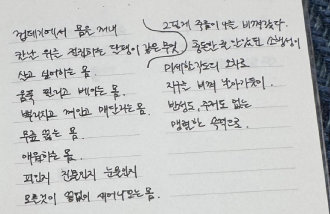[Opinion] Granting Pardon
There is a saying Every law has its soft side, which implies that exercising leniency can offset the strictness of the law. Issuing pardon is a way to institutionalize forgiveness and peace, which hardly becomes the word judicial justice. Granting clemency is welcoming in that it gives the law a human touch.
Back in the era of absolute monarchy, the highness often exercised the power to grant pardon at his will. In the modern era of democracy where everyone is supposed to be treated equally, however, it is not that simple any more as more people grow unsatisfied with what they get.
It was long ago when rulers in Korea began to pardon those who committed crimes. According to History of Three Kingdoms, King Munmu in Shilla Dynasty granted clemency to a number of criminals to celebrate the unification of three kingdoms.
Jungjong, king of Korea Dynasty who ascended to the throne in the year of 1034, issued decrees of special pardon twice in 1035 and 1036 in an attempt to gain public confidence and restore political stability after a series of natural disasters. In a rare move, he even reduced some death sentences to life imprisonment, the history recorded.
The tradition of granting pardon on a special occasion has continued through present days about 80 special pardons have been sought by the government of the Republic of Korea since its foundation.
The first one came in September 1948 at the time of foundation of the government. The government under former dictator Jun issued a decree of pardon more than 20 times in an attempt to reduce the number of political prisoners produced under his rule.
The Kim Dae-jung government, which pardoned 5.32 offenders in 1998 in time for his inauguration, recently cleaned the records of 4.8 million traffic violators. And credit card companies are reportedly considering write off demerit points of debt defaulters in August. Then the country could surprise the world yet again, this time for its leniency.
We do not need to feel jealous of others luck. We cannot but wonder, however, whether the government has ever thought of granting rewards to law-abiding citizens who teach their children to follow the law. When the distinction is blurred between those who abide by the law and those who do not, people might find no reason to follow the law.







